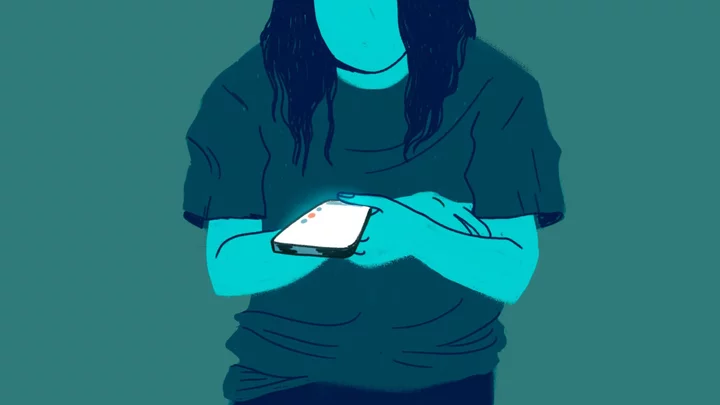Life is full of opportunities to feel bad about yourself.
But if we're honest about the role the internet plays in our everyday lives, social media has a unique way of invading the psyche and worsening our mental health. It can amplify our critical inner voice when we see people forming cliques to which we don't belong, images of celebrities who look impossibly perfect, and influencers whose meteoric success prompts envy and self-doubt. It can also make bullying instantaneous and constant, instead of limited to a physical workplace or classroom.
The difference between real life and the internet is that social media platforms bring these feelings, in a 30-second scroll, to the palm of our hands. The algorithms powering them keep serving up that content, seemingly unable to make a distinction between genuine interest in what we're seeing and lingering born of disappointment, frustration, or anger.
This is particularly hard on kids and teens, who've yet to develop coping skills and experience that builds self-confidence and perspective. And it's why many people are so angry about how platforms like Facebook, Instagram, and TikTok help create toxic environments for young people.
SEE ALSO: 'You're always on': Warnings from the front lines of the teen mental health crisisWhile we can't expect youth to develop the skills to navigate these challenges without also demanding fundamental change from social media companies to improve safety and prioritize well-being over engagements and profits, certain strategies help diminish the influence of negative, habitual thoughts that are based on faulty or inaccurate assumptions.
These thoughts have a name: cognitive distortions.
They happen to everyone, regardless of age or internet use, but Dr. Willough Jenkins, psychiatrist and inpatient medical director of Rady Children's Hospital-San Diego, says cognitive distortions are commonly expressed by youth in emotional or psychological distress. This is particularly true when struggles are related to digital media use. Feeling excluded online, viewing images that promote disordered eating, and being digitally harassed or bullied all can unleash negative thoughts.
Seeing someone who looks flawless might lead to thoughts like: "Oh, I'm so ugly. I'm worthless." Jenkins says that's an example of all-or-nothing thinking, one of 10 common cognitive distortions. If watching a funny influencer on TikTok prompts someone to reflect on their own sense of humor by thinking, "Gosh, I'm not nearly as quick-witted and funny," that may represent a cognitive distortion known as discounting the positive because they've dismissed how they make their friends laugh. Should statements, like "I should exercise more" or "I should dress like that," might be what a young user tells themselves after seeing their friends' selfies. Such statements can reinforce negative thinking through their scolding, self-blaming nature.
"If you label your thought, it takes a little bit of the power away from it."Tackling cognitive distortions can seem intimidating or overwhelming, but Jenkins says the following strategies can be effective. Of course, young people should seek professional help and guidance when they feel it's necessary.
1. Label cognitive distortions.
The first step in dealing with cognitive distortions is to name them. Young patients treated for mental health issues at Rady Children's are encouraged to learn all 10 of the cognitive distortions for this reason. (Jenkins suggests this list.)
"If you label your thought, it takes a little bit of the power away from it," says Jenkins, who is also an assistant professor of psychiatry at University of California at San Diego. "It allows you to tackle it because you've broken it down into what it is rather than just feeling this looming negativity."
2. Weigh the evidence.
Jenkins recommends labeling cognitive distortions by writing them down when you experience them, which helps to see and understand them clearly. Next, she suggests listing the evidence for or against each thought. So if you truly think you're the ugliest person in the world, does your list for that thought really support it, or does it reflect fears or anxieties about your appearance?
While using this method, Jenkins says it's important for young people to list things they're proud of, which can effectively dilute the negative thought and shift your frame of mind. It's also critical to remember that not every negative thought is true. You can still be beautiful to yourself or others, regardless of an inner voice that may insist otherwise. That's when it can be helpful to get objective feedback from someone you trust, like a friend, parent, or therapist.
SEE ALSO: Influencers aren't going anywhere. So what does that mean for today's teens?3. Distraction is your friend.
Distraction is another helpful strategy. Passing time by doing things that make you feel good, like drawing, cooking, or going for a walk, can alleviate the pressure of cognitive distortions.
"A lot of thoughts feel really strong in the moment, but with more time that goes by they usually get a little bit less, just on their own naturally," says Jenkins.
4. Let it go.
If you keep returning to a negative thought despite labeling it as a cognitive distortion and talking about it, Jenkins recommends leaving it be. The mindfulness technique of observing a thought without judgment, then letting it pass can help create much-needed distance.
5. Treat yourself like you would a friend.
Often, the way you treat a friend in pain is different than your internal dialogue. Try talking to yourself like someone else you love and see if that softens or eliminates a negative thought.
6. Be mindful of physical and emotional red flags.
Common signs that you're negatively affected by social media include: constant use; difficulty falling asleep; feeling anxious (on edge, panicky or heart racing) while online; struggling to be present during in-person social interactions; overwhelming fear of missing out (FOMO); and thumb pain caused by too much scrolling. Noticing these signs won't stop or diminish negative thoughts, but can remind you of the importance of self-care practices, like meditation and limiting social media exposure.
7. Remember that negative feelings are normal.
Acknowledging cognitive distortions doesn't mean you can never feel or express negativity. Indeed, such thoughts may reflect experiencing injustice or cruelty. A child who is subjected to racism, bullying, or physical, emotional, or sexual abuse needs those circumstances to change, not to simply become more resilient to them.
"Tackling negative thinking depending on the trigger doesn't mean that what triggered you is OK, but knowing these skills is really helpful in all of life," says Jenkins. "Sometimes it will be a situation that's absolutely unjust or something that's wrong, but you still need to be able to go to sleep that night and get some rest."
If you're feeling suicidal or experiencing a mental health crisis, please talk to somebody. You can reach the 988 Suicide and Crisis Lifeline at 988; the Trans Lifeline at 877-565-8860; or the Trevor Project at 866-488-7386. Text "START" to Crisis Text Line at 741-741. Contact the NAMI HelpLine at 1-800-950-NAMI, Monday through Friday from 10:00 a.m. – 10:00 p.m. ET, or email info@nami.org. If you don't like the phone, consider using the 988 Suicide and Crisis Lifeline Chat at crisischat.org. Here is a list of international resources.
Originally published in November 2021, this story was updated in June 2023.









